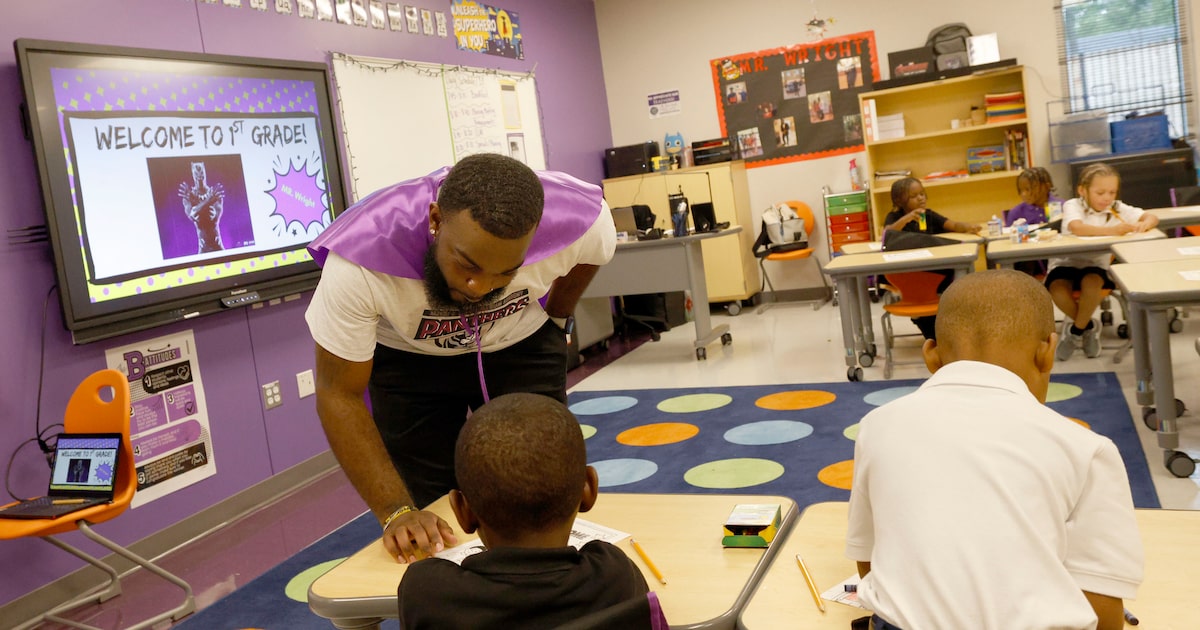Five Dallas ISD schools saw higher A-F accountability grades after district officials learned that thousands of students were awarded marks that were too low on the state standardized test.
When Dallas ISD asked the Texas Education Agency to rescore over 5,000 STAAR tests earlier this year, more than one-third of the exams they submitted for review came back with higher scores.
Each test carries weight, as STAAR results fuel the state’s academic accountability system, which assigns A-F grades to every school and district.
Related:What are Texas’ A-F school grades, and why do they matter?
The Education Lab
The rescored responses caused five Dallas ISD schools to earn higher A-F grades compared to the district’s initial projections before the review, Superintendent Stephanie Elizalde said.
Young Men’s Leadership Academy was projected to receive an F for the second year in row, Elizalde said. Failing ratings can trigger significant consequences if the school doesn’t improve quickly, including the possibility of a state takeover.
After 44 STAAR tests from the campus were rescored, 18 came back with additional points. The school ultimately received a D.
The other schools that improved were John Lewis Social Justice Academy, which went from a D to C, Seagoville Elementary from a C to B, Henry B. Gonzalez Personalized Learning Academy from a C to B, and Walnut Hill International Leadership Academy from a B to A.
Last year, district officials requested the review of more than 4,600 STAAR tests and roughly 43% came back with additional points.
Related:Dallas ISD asked Texas to rescore thousands of STAAR tests; about one-third went up
“It does not appear to me that this is a one-off,” Elizalde said. “Last year might have been, but now I’ve got two years in a row. Once is an outlier, twice is a pattern.”
To Elizalde, the improved A-F grades demonstrate that Texas needs to work with districts to recalibrate how it grades its STAAR exams.
Otherwise, she said, district officials and families will lose confidence in the state’s evaluations of educators, students and schools. Parents often consider the A-F ratings when deciding where to enroll their children.
“There’s way too many discrepancies,” Elizalde said.
TEA spokesperson Jake Kobersky said the improved scores show the STAAR rescoring system is working as it should. The agency does not caculate schools’ accountability ratings until after the rescore window closes.
Texas students took more than 3 million reading tests last school year. So far, roughly 21,600 of those have been submitted for rescoring and nearly 6,200 — 28% — saw changes.
The agency does not allow students’ scores to be lowered during a review. The number of points can either go up or remain unchanged.
“TEA continues to accept rescore requests,” Kobersky said in a statement Thursday. “If school district leaders believe this could change their accountability rating, they may appeal that rating.”
The improved ratings come as frustration over the way Texas uses computers to grade student essays on STAAR tests has continued to mount. When tests are rescored, a human reviews them.
Related:Why is Texas releasing 2024 and 2025 A-F school grades at the same time?
Several district leaders across the state zeroed in on the use of automated scoring in a 2024 lawsuit against Education Commissioner Mike Morath, which sought to block the release of the annual A-F ratings.
After the state education agency began using computers in 2023, many district officials noticed a large number of high schoolers scored zeroes on their written responses. Scores generated this way “threaten to unfairly — and unlawfully — lower the A–F ratings of many school districts and campuses,” the lawsuit states.
A court ruled against them in July, saying the state brought forward experts who “supported the validity and reliability of automated scoring in great detail.” That ruling gave the education agency the go-ahead to release the 2024 ratings.
Morath and other agency officials have defended the use of computers to score tests, saying the system is reliable and efficient.
This year’s improved scores also mean Dallas ISD is a step closer to Elizalde’s goal of having have zero D or F scores by the 2026-2027 school year.
Overall, the district earned a B, up from a C in 2023.
Sixty Dallas schools earned an A, while another 103 scored a B. Two campuses received Fs, down from 24 last year.
Nearly 93% of Dallas ISD’s 228 campuses earned an A, B or C.
A-F scores
The state’s A-F grades are based largely on standardized test scores. The formula takes into account three categories for the grades: student achievement, school progress and closing the gaps.
“Student achievement” considers how children performed on the State of Texas Assessments of Academic Readiness, or STAAR, tests. For high schools, it also weighs graduation rates and other metrics.
“School progress” factors in how much improvement students made year over year or how well they did in relation to comparable campuses.
“Closing the gaps” looks at how schools educate children in different groups, such as those living in poverty or receiving special education services.
Seventy percent of the grade is based on either student achievement or school progress — whichever is the higher grade — while closing the gaps makes up 30%.
Families can find the latest results on TXschools.gov.
The DMN Education Lab deepens the coverage and conversation about urgent education issues critical to the future of North Texas.
The DMN Education Lab is a community-funded journalism initiative, with support from Bobby and Lottye Lyle, Communities Foundation of Texas, The Dallas Foundation, Dallas Regional Chamber, Deedie Rose, Garrett and Cecilia Boone, Judy and Jim Gibbs, The Meadows Foundation, The Murrell Foundation, Ron and Phyllis Steinhart, Solutions Journalism Network, Southern Methodist University, Sydney Smith Hicks, and the University of Texas at Dallas. The Dallas Morning News retains full editorial control of the Education Lab’s journalism.
